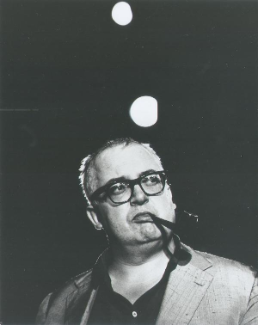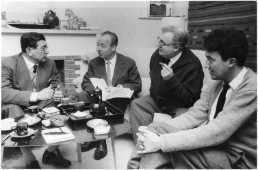
On 5th January 1921 Friedrich Dürrenmatt was born in Konolfingen in Emmental as the son of a Protestant minister. He spent his youth and student years (German literature and philosophy) in Berne. Breaking off his studies in 1946, he married the actress Lotti Geissler and worked from then on as a writer. After some years in Basel and at Ligerz on the Lake of Bienne, during which time his three children were born and Dürrenmatt was able to record his first successes as a playwright, he moved in 1952 to the house on the Pertuis-du-Sault in Neuchâtel, where he was to spend the rest of his life. Here Dürrenmatt worked in peace and seclusion on his extensive oeuvre. But he also travelled widely, both in Switzerland and abroad, above all in connection with the production of his plays. Following the death of his first wife, Dürrenmatt married the actress and film director Charlotte Kerr in 1984. Dürrenmatt died of a heart attack on 14th December 1990, a few days before his seventieth birthday.

Friedrich Dürrenmatt was known for his sociability; he was a great connoisseur and lover of Bordeaux wines with an impressive wine cellar. In company, moreover, he was an entertaining and fascinating story-teller, always reshaping his material in new variations. He had countless friends, above all among actors, and gave many of his fellow writers discreet financial support. Dürrenmatt was highly interested in the natural sciences, especially astronomy. With his telescope he would observe the stars for nights on end. His work as a writer was characterized by great discipline and professionalism; he wrested his texts from his diabetes, which accompanied him as a constant memento mori.
After the great success of his play "Der Besuch der alten Dame" (The Visit), 1956, Friedrich Dürrenmatt became a world-famous author. His works were translated into over 40 languages and the author received numerous prizes, including the Georg Büchner Prize, the "Grosse Preis" of the Swiss Schiller Foundation and the Austrian State Prize for European Literature. Dürrenmatt took little part in discussions on current political events, but frequently took up a resolute stance on important matters. Issues which occupied him throughout his life were the federalistic model of our small state of Switzerland, the fate of the Jews and co-existence between the Israelis and Palestinians as well as the momentum of the Cold War.

